 The logarithm of a quotient is equal to the logarithm of the dividend minus the logarithm of the divisor. , M , ,• , . logi — = log The logarithm of a quotient is equal to the logarithm of the dividend minus the logarithm of the divisor. , M , ,• , . logi — = log  Plane Trigonometry - Page 177by Levi Leonard Conant - 1909 - 183 pagesFull view Plane Trigonometry - Page 177by Levi Leonard Conant - 1909 - 183 pagesFull view - About this book
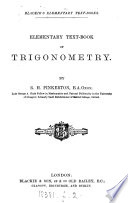 | Robert Hamilton Pinkerton - Trigonometry - 1884 - 194 pages
...logarithm of the product of two or more numbers is equal to the sum of the logarithms of the numbers. II. The logarithm of a quotient is equal to the logarithm of the dividend diminished by the logarithm of the divisor; or (what is the same thing differently expressed) the logarithm... | |
 | William Steadman Aldis - Algebra - 1887 - 616 pages
...factors. 625. Similarly by division whence by definition lm lo&» n = xy, - loga»t-loga«, (2) or the logarithm of a quotient is equal to the logarithm of the dividend diminished by that of the divisor. 626. Again, with the same notation, if m = a*, it follows that m"... | |
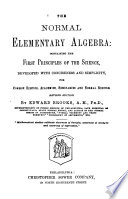 | Edward Brooks - Algebra - 1888 - 344 pages
...log (MxN). Or, log ( M x Л) - log M+ log N. PRIN. 4. The logarithm of the quotient of two numbers ù equal to the logarithm of the dividend minus the logarithm of the divisor. For, let m = log M, and n = log N. Then, B" = M, B*=N. Dividing, S^~jn = MiN. Hence, log ( M •*•... | |
 | John Bernard Clarke - Algebra - 1889 - 566 pages
...Then, (509), a^N' (1), a»"=N" (2). Multiply (1) by (2), member by member. II. The logarithm of any quotient is equal to the logarithm of the dividend, minus the logarithm of the divisor. Divide (1) (I) by (2), member by member. III. The logarithm of any power of a quantity is equal to... | |
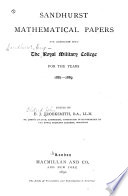 | Royal Military College, Sandhurst - Mathematics - 1890 - 144 pages
...Prove that, if a ft are the roots of the equation ax* + (a + b}x + b = o, . /3 a . b 10. Prove that the logarithm of a quotient is equal to the logarithm of the dividend diminished by the logarithm of the divisor. Given loge 2 = '69314718, log,. 3 = 1-09861229 ; find the... | |
 | William Findlay Shunk - Railroad engineering - 1890 - 360 pages
...The logarithm of the product of twp numbers is equal to tb* sum of the logarithms of the numbers. « The logarithm of a quotient is equal to the logarithm of the dividend diminished by that of the divisor. The logarithm of any power of a number is equal to the logarithm... | |
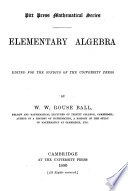 | Walter William Rouse Ball - Mathematics - 1890 - 512 pages
...^°£a dwnp ... ) = tc + y + z + ... - loga m + loga n + \ogap + ... . 256. Logarithm of a Quotient. The logarithm of a quotient is equal to the logarithm of the dividend diminished by the logarithm of the divisor. Let m be the dividend, and let n be the divisor, and let... | |
 | William Joseph Hussey - Logarithms - 1891 - 172 pages
...use are as follows: The logarithm of a product is equal to the sum of the logarithms of its factors: The logarithm of a quotient is equal to the logarithm...the dividend. minus the logarithm of the divisor. The logarithm of any power of a number is equal to the logarithm of the number multiplied by the index... | |
 | William Joseph Hussey - Logarithms - 1891 - 178 pages
...use are as follows: The logarithm of a product is equal to the sum of the logarithms of its factors. The logarithm of a quotient is equal to the logarithm of the dividend, minus tJte logarithm of the divisor. The logarithm of any power of a number is equal to the logarithm of... | |
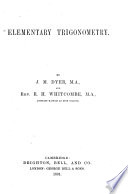 | John Maximilian Dyer - Plane trigonometry - 1891 - 306 pages
...log. n + log. p. In the same way the theorem can be extended to any number of factors. 106. Theorem 2. The logarithm of a quotient is equal to the logarithm of the numerator minus the logarithm of the denominator. щ Let — be the quotient, a the base ; we have... | |
| |